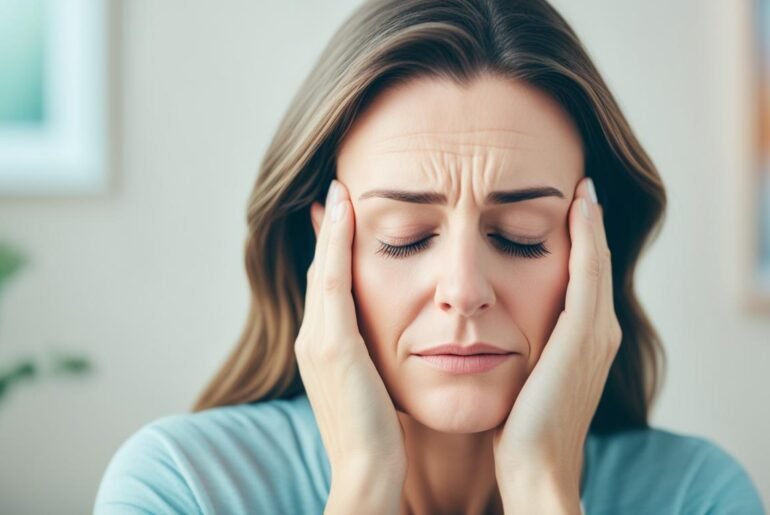Did you know that stress-induced aging can make your skin look up to 3.5 years older? Stress hormones like cortisol can cause dehydration, sallowness, roughness, and deep expression lines on the skin. The impact of stress on our skin is undeniable, but the good news is that there are natural remedies to reverse these effects.
Key Takeaways:
- Stress-induced aging can make your skin look up to 3.5 years older.
- Stress hormones like cortisol can cause dehydration, sallowness, roughness, and deep expression lines on the skin.
- There are natural remedies to reverse the effects of stress-induced skin aging.
- By adopting holistic approaches, you can achieve a more youthful, radiant complexion.
- Prioritizing mental and physical well-being is key to reversing stress-induced skin aging naturally.
How Stress Affects Your Skin
Stress can have detrimental effects on your skin, the body’s largest living organ. The constant release of stress hormones, such as cortisol, can lead to various skin issues, including dehydration, sallowness, roughness, and deep expression lines. Additionally, stress can accelerate the natural aging process, resulting in premature aging skin.
When the body is under stress, cortisol levels rise, triggering the production of sebum, which can clog pores and lead to acne breakouts. Furthermore, stress can impair the skin’s barrier function, causing moisture loss and leaving the skin dry, dull, and prone to irritation.
The Effects of Stress Hormones on the Skin
Stress hormones, particularly cortisol, can have a profound impact on the skin. High cortisol levels can disrupt collagen production, leading to a loss of elasticity and firmness. This can result in the formation of deep expression lines, wrinkles, and sagging skin. Moreover, stress hormones can compromise the skin’s natural ability to repair and regenerate, hindering the healing process and exacerbating existing skin conditions.
The Accelerated Aging Process
Chronic stress and the resulting increase in stress hormones can speed up the aging process. The prolonged exposure to cortisol can lead to oxidative stress, inflammation, and damage to the skin’s structural integrity. These effects contribute to the breakdown of collagen and elastin fibers, leading to the formation of fine lines, wrinkles, and age spots.
Chronic stress can cause premature aging skin, making individuals look older than their biological age.
To effectively combat the effects of stress on the skin, it is crucial to adopt a holistic approach that addresses both the external and internal factors contributing to stress-induced skin aging. By implementing stress management techniques and adopting a comprehensive skincare regimen, you can preserve the youthful appearance of your skin and promote overall well-being.
Step 1 – Be Kind to Your Mind

Taking care of your mental health is essential for healthy skin. Stress can have a significant impact on the appearance of our skin, so it’s important to find effective ways to manage stress and promote a calm mind.
One powerful technique for stress management is mindfulness. By practicing mindfulness, you can bring your attention to the present moment and cultivate a sense of calm and relaxation. Mindfulness involves focusing on your breathing, body sensations, and thoughts without judgment.
Meditation is another effective tool for reducing stress and promoting overall well-being. It involves setting aside time each day to sit quietly, focus on your breath, and observe your thoughts and emotions without getting caught up in them. Meditation has been shown to reduce stress, improve sleep quality, and enhance overall mental health.
Deep breathing exercises can also be incredibly helpful for managing stress. By taking slow, deep breaths, you activate the body’s relaxation response, which can help reduce stress and anxiety. Deep breathing exercises can be done anywhere and at any time, making them a convenient tool for stress management.
Practicing stress management techniques like mindfulness, meditation, and deep breathing can interrupt the flow of stress and promote a calm mind. By incorporating these practices into your daily routine, you can support healthier, more youthful-looking skin.
Step 2 – Awaken Your Body
Exercise is not only beneficial for overall health but also for skin health. Engaging in regular physical activity can have a positive impact on your skin and help reverse stress-induced skin aging.
One of the key benefits of exercise for skin health is increased blood flow. When you exercise, your heart rate increases, pumping more blood throughout your body. This increased blood flow allows for better oxygen and nutrient delivery to the skin cells, promoting a healthy complexion.
Exercise also has a profound effect on your mood and mental well-being. Physical activity triggers the release of dopamine and serotonin, often referred to as “feel-good” chemicals. These neurotransmitters can boost your mood and increase feelings of happiness and well-being.
“Exercise not only promotes physical fitness but also improves mental health and enhances overall well-being.”
Incorporating exercise into your routine can help reverse the effects of stress-induced skin aging. Whether it’s going for a run, practicing yoga, or taking a dance class, find an activity that you enjoy and make it a regular part of your schedule. Aim for at least 30 minutes of moderate-intensity exercise most days of the week to reap the benefits for your skin and overall health.
Benefits of Exercise for Skin Health
- Increased blood flow to deliver oxygen and nutrients to the skin cells
- Promotion of a healthy complexion
- Release of dopamine and serotonin for improved mood and happiness
- Reduction of stress and its negative effects on the skin
- Improved overall health and well-being
By incorporating regular exercise into your routine, you can awaken your body and promote skin health from within. Exercise not only benefits your physical fitness but also plays a vital role in achieving youthful, radiant skin.
Step 3 – Eat Your Water
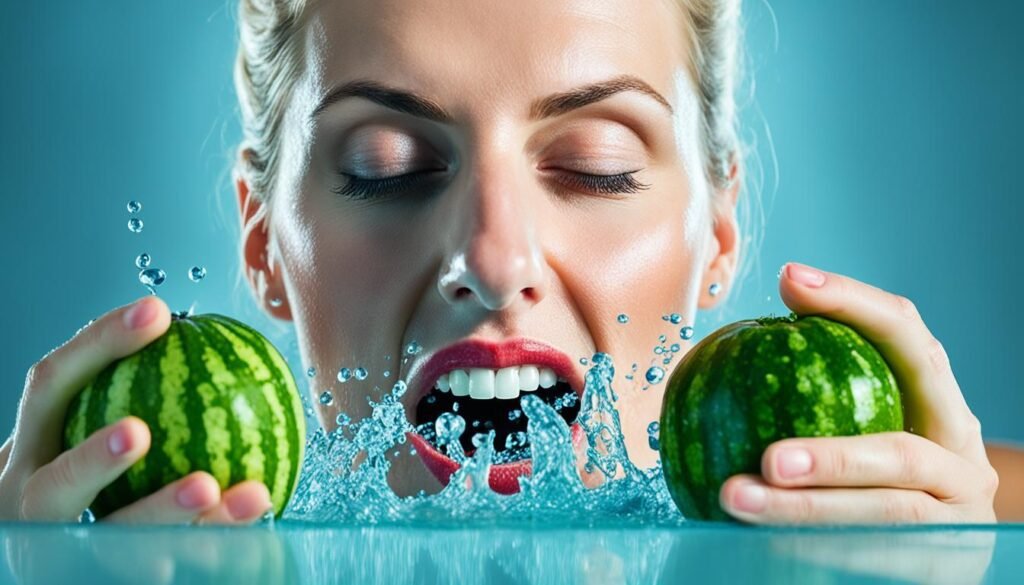
Proper nutrition plays a crucial role in reversing stress-induced skin aging. Hydrating the body from within by consuming water-rich and nutrient-dense foods is essential. While indulgences are allowed, it’s important to focus on healthy, nutritious foods to equip the body to handle stress and its effects on the skin.
One of the best ways to hydrate the body is by incorporating water-rich foods into your diet. These foods not only help improve hydration levels but also provide essential vitamins and minerals that promote skin health. Some examples of water-rich foods include:
- Cucumbers
- Watermelon
- Strawberries
- Grapefruit
- Cantaloupe
- Oranges
These fruits have high water content and are also packed with antioxidants that help protect the skin from oxidative stress. By including these foods in your diet, you can ensure optimal hydration and nourishment for your skin.
Additionally, incorporating nutritious foods that are high in vitamins and minerals can also support skin health. Some examples of vitamin-dense foods include:
- Leafy greens like spinach and kale
- Broccoli
- Citrus fruits
- Avocados
- Almonds and walnuts
These foods are rich in vitamins A, C, E, and K, which are essential for maintaining healthy skin. They help protect against oxidative damage, promote collagen production, and enhance skin elasticity.
The Power of Vitamin C
Vitamin C is a powerful antioxidant that aids in collagen synthesis, protects against UV damage, and promotes skin brightening.
Incorporating vitamin C-rich foods, such as citrus fruits and berries, can provide an extra boost to your skin health. Including these foods in your diet can help reverse stress-induced skin aging and leave you with a glowing complexion.
Remember that hydration and nutrition go hand in hand when it comes to skin health. By consuming water-rich and vitamin-dense foods, you can nourish your skin from within and support its natural rejuvenation process.
| Water-Rich Foods | Vitamin-Dense Foods |
|---|---|
| Cucumbers | Leafy greens like spinach and kale |
| Watermelon | Broccoli |
| Strawberries | Citrus fruits |
| Grapefruit | Avocados |
| Cantaloupe | Almonds and walnuts |
| Oranges |
Step 4 – Nourish Your Skin
https://www.youtube.com/watch?v=AXaJuM5VjGU
Taking care of your skin with a targeted skincare regimen is vital for reversing stress-induced skin aging. By incorporating stress-reducing ingredients and super-hydrating products into your routine, you can effectively combat the signs of stress aging.
Look for skincare products that contain powerful ingredients to address specific skin concerns caused by stress. For visible skin wrinkling, opt for products with neuropeptides, which can help minimize the appearance of fine lines and wrinkles. Additionally, wild indigo is an excellent stress-reducing ingredient that can calm the skin’s stress signals, providing a soothing effect.
Hyaluronic acid is a super-hydrating ingredient that can provide immediate and lasting hydration benefits. It attracts and retains moisture in the skin, helping to plump and rejuvenate the complexion.
One highly recommended product to incorporate into your skincare regimen is a retinol night cream. Retinol is a powerful ingredient known for its ability to stimulate collagen production, reduce fine lines and wrinkles, and improve skin texture and tone. A retinol night cream can help reverse the signs of stress aging, revealing smoother, more vibrant skin.
Benefits of incorporating products with stress-reducing and super-hydrating ingredients:
- Minimizes the appearance of fine lines and wrinkles
- Soothes and calms stressed skin
- Provides immediate and lasting hydration
- Plumps and rejuvenates the complexion
- Stimulates collagen production
- Improves skin texture and tone
| Skincare Regimen | Stress-reducing Ingredients | Super-hydrating Effects |
|---|---|---|
| Neuropeptides | Address visible skin wrinkling | |
| Wild indigo | Calms the skin’s stress signals | |
| Hyaluronic acid | Provides immediate and lasting hydration | |
| Retinol night cream | Reduces fine lines and wrinkles, improves skin texture and tone |
The Link Between Stress and Biological Age
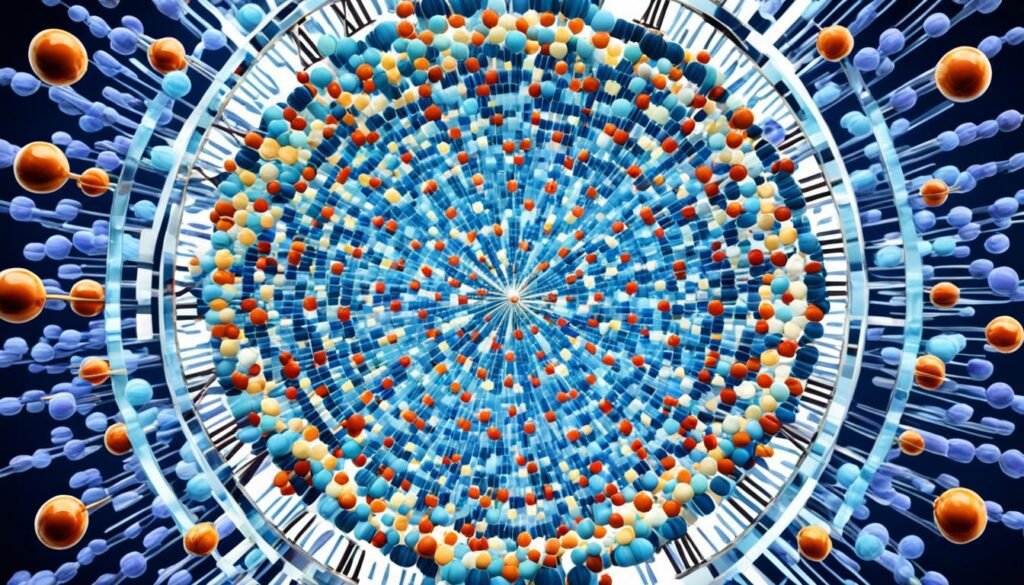
Long-term stress can have a significant impact on our biological age, the age at which our body functions and exhibits signs of aging. However, recent studies suggest that the effects of stress on biological age can be reversible. One of the ways scientists measure changes in biological age is through DNA methylation clocks, which analyze changes in our DNA that occur as a result of stress or aging.
The immune system plays a crucial role in the link between stress and biological age. Chronic stress can trigger immune system responses that lead to inflammation and increase the risk of certain diseases. Additionally, stress-induced immune system dysregulation can accelerate the aging process at a cellular level.
“The study suggests that naturally occurring periods of stress, such as short-term acute stress, may actually trigger reversible changes in biological age. This indicates that our body has the ability to adapt and recover from stress-induced changes.”
Understanding the link between stress and biological age is essential for developing strategies to reverse the effects of stress-induced aging. By managing stress levels and adopting healthy lifestyle practices, it may be possible to slow down or even reverse the signs of aging at a cellular level.
| Effects of Stress on Biological Age | Methods to Reverse Stress-Induced Aging |
|---|---|
| Chronic stress can accelerate biological aging. | Manage stress through relaxation techniques. |
| Stress-related immune system dysregulation increases the risk of diseases. | Adopt a healthy diet and lifestyle. |
| Short-term periods of stress can trigger reversible changes in biological age. | Engage in regular exercise and prioritize self-care practices. |
By addressing the underlying causes of stress and implementing holistic approaches to manage it, we can combat the effects of stress on our biological age and promote healthier aging.
To better understand the link between stress and biological age, let’s explore how DNA methylation clocks work in more detail:
Understanding DNA Methylation Clocks
DNA methylation is a chemical modification of our DNA that can affect gene expression and cellular function. DNA methylation clocks analyze specific sites in our DNA to measure the age-related changes that occur over time. These clocks provide an estimate of an individual’s biological age based on the patterns of DNA methylation at these sites.
Researchers have found that chronic stress can affect DNA methylation patterns, accelerating the aging process. Conversely, stress management techniques, such as mindfulness meditation and exercise, have been shown to reverse some of these changes and slow down the biological aging process.
It is important to note that while stress can impact our biological age, it is just one of the many factors that contribute to aging. Other lifestyle choices, such as diet, exercise, and sleep, also play a significant role in our overall health and aging process.
In the next section, we will explore the various effects of stress on the body and mind and discuss the importance of adequate sleep in reversing stress-induced aging.
Effects of Stress on the Body and Mind
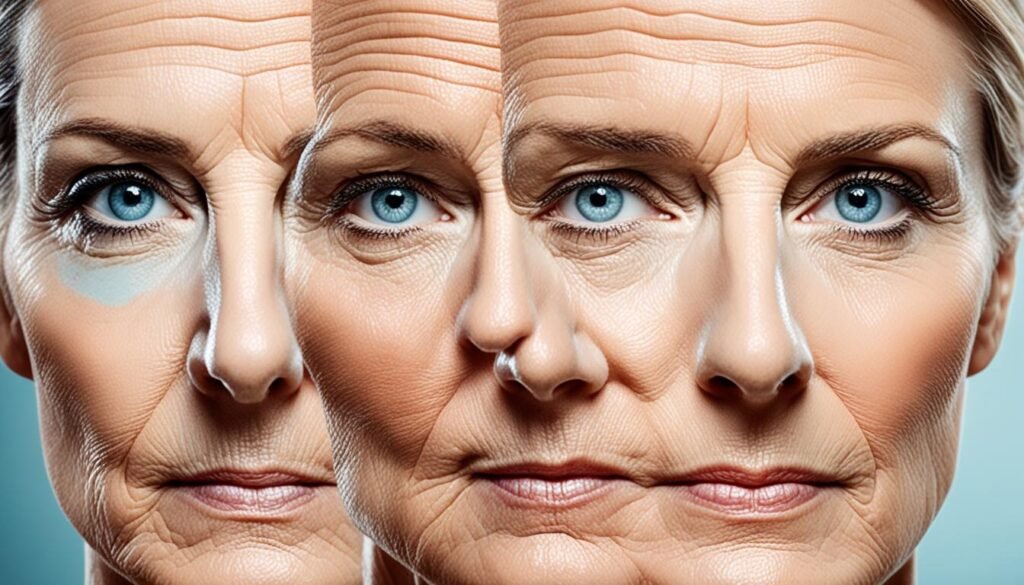
When faced with stress, the body goes into a fight or flight response, releasing cortisol and other stress hormones. This physiological reaction prepares the body to either confront the stressor or flee from it. The fight or flight response triggers a cascade of physical reactions, which can have both immediate and long-term effects on the body and mind.
One of the key hormones released during the fight or flight response is cortisol. This hormone helps regulate various bodily functions, including blood sugar levels, metabolism, inflammation, and immune response. While cortisol is essential for survival in acute stress situations, chronic stress can lead to elevated cortisol levels, which can have negative consequences on the body and mind.
Chronic stress, characterized by long-term exposure to stressors without adequate relief, can disrupt the body’s natural balance. The prolonged release of cortisol and other stress hormones can result in increased heart rate, elevated blood pressure, quickened breathing, heightened awareness, and the production of adrenaline. These physical reactions prepare the body for immediate action, but when stress becomes chronic, they can have detrimental effects.
High levels of cortisol over an extended period can lead to a range of physical and mental health issues. Some of the physical reactions associated with chronic stress include:
- High blood pressure
- Impaired immune function
- Weight gain or loss
- Insomnia or sleep disturbances
- Digestive problems
- Headaches
- Increased risk of heart disease
Additionally, chronic stress can impact mental well-being and contribute to conditions such as anxiety and depression. The prolonged release of cortisol can disrupt neurotransmitter balance, affecting mood regulation and cognitive function.
“Chronic stress can have a profound impact on the body and mind, leading to a range of physical reactions and mental health issues. It’s important to address and manage chronic stress to prevent long-term consequences on overall well-being.”
| Physical Reactions of Chronic Stress | Effects on the Body |
|---|---|
| Increased heart rate | Strain on the cardiovascular system, increased risk of heart disease |
| Elevated blood pressure | Increased risk of hypertension and cardiovascular problems |
| Quickened breathing | Reduced oxygen levels, respiratory problems |
| Heightened awareness | Increased vigilance but potential for anxiety and hyperarousal |
| Production of adrenaline | Enhanced physical performance, but prolonged release can lead to fatigue and exhaustion |
It’s essential to recognize the impact of chronic stress on both the body and mind. By implementing stress management techniques, such as mindfulness practices, stress reduction strategies, and seeking support from healthcare professionals, individuals can mitigate the negative effects of chronic stress and improve overall well-being.
The Importance of Adequate Sleep

Adequate sleep plays a crucial role in skin regeneration and reversing the effects of long-term stress on our complexion. When we sleep, our bodies prioritize repairing themselves, and this includes the production of collagen, a protein that reduces wrinkles and adds plumpness to the skin.
Sleep is also the time when growth hormone production is at its peak. Growth hormones aid in the repair and rejuvenation of damaged cells, promoting healthier and more youthful-looking skin.
Poor sleep, on the other hand, can have detrimental effects on our skin. It can lead to inflammation, which can manifest as redness or irritation on the skin’s surface. Inadequate sleep can also contribute to acne breakouts, increased skin sensitivity, and dryness.
To reverse stress-induced skin aging, it is essential to prioritize restful sleep as part of your self-care routine. By establishing healthy sleep habits and ensuring you get enough quality sleep, you can enhance your skin’s natural regeneration process and minimize the visible signs of stress on your skin.
The Effects of Sleep Deprivation on the Skin
Sleep deprivation can have several negative consequences for our skin:
- Promotes inflammation, leading to redness and irritation
- Increases the likelihood of acne breakouts
- Compromises the skin’s barrier function, leading to increased sensitivity
- Reduces the skin’s ability to retain moisture, causing dryness
By prioritizing restful sleep, you can combat these effects and support your skin’s natural healing and rejuvenation processes.
“Investing in sufficient sleep is one of the best skincare routines you can achieve. It’s the time when your skin can truly regenerate and repair itself from the effects of stress and other environmental factors.”
– Dr. Lily Chen, Dermatologist
Optimizing Your Sleep Routine
To promote restful sleep and optimize your skin’s regeneration capabilities, consider incorporating the following tips into your sleep routine:
- Create a consistent sleep schedule by going to bed and waking up at the same time every day.
- Establish a relaxing bedtime routine, such as taking a warm bath, reading a book, or practicing gentle stretching exercises.
- Create a sleep-friendly environment by ensuring your bedroom is cool, dark, and quiet.
- Avoid electronic devices, caffeine, and heavy meals close to bedtime, as they can disrupt sleep quality.
- Incorporate stress-reducing practices before bed, such as meditation, deep breathing exercises, or listening to calming music.
By prioritizing healthy sleep habits and practicing self-care, you can support your skin’s natural regeneration process and achieve a more vibrant and youthful complexion.
The Role of Exercise in Stress Reduction

Exercise is an effective and natural way to relieve stress and promote overall well-being. Not only does exercise have numerous benefits for your physical health, but it also plays a crucial role in reducing stress and its impact on the body. By incorporating regular exercise into your routine, you can improve brain health, enhance muscle strength, and maintain skin elasticity.
When you engage in physical activity, your brain releases endorphins, which are known as “feel-good” chemicals. These endorphins act as natural stress relievers, helping to reduce anxiety and improve your mood. Regular exercise also promotes the production of neurotransmitters like dopamine and serotonin, which can further enhance your sense of well-being.
Beyond its effects on brain health, exercise also has positive impacts on muscle strength and elasticity. Strength training exercises, such as weightlifting or bodyweight exercises, help build and tone your muscles, improving your overall physical strength. Additionally, exercises that promote flexibility, like yoga or pilates, can help maintain the elasticity of your muscles and skin.
Incorporating exercise into your daily routine can have a profound impact on your stress levels and overall skin health. Whether it’s going for a brisk walk, participating in a group exercise class, or engaging in a favorite sports activity, finding a form of exercise that you enjoy will make it easier to stick with your fitness routine.
| Benefits of Exercise for Stress Reduction | How You Can Incorporate Exercise into Your Routine |
|---|---|
|
|
Remember to always listen to your body and consult with a healthcare professional before starting any new exercise regimen. By prioritizing regular exercise, you can effectively reduce stress, improve brain health, and maintain muscle strength and skin elasticity, all of which contribute to a healthier and more resilient you.
The Impact of Diet on Skin Health
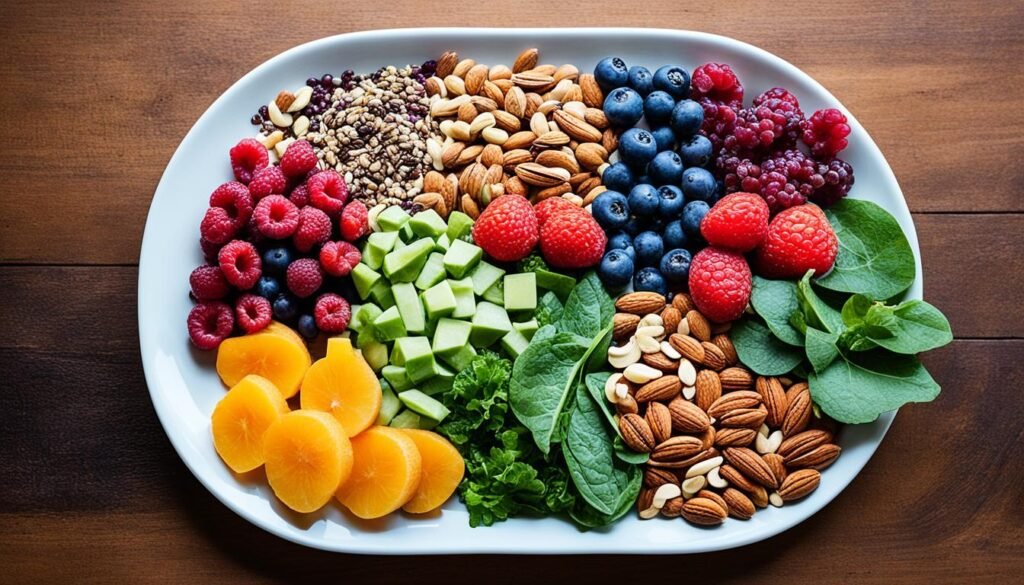
A balanced diet plays a crucial role in maintaining skin health and reversing the effects of stress on the face. By nourishing your body with nutrient-dense foods, you can promote collagen production, hydration, and overall skin vitality.
Collagen-Boosting Protein Sources
Protein is the building block of collagen, a vital protein responsible for skin elasticity and firmness. Including protein sources like grass-fed beef and wild fish in your diet provides essential amino acids necessary for collagen production. These nutrient-rich foods support the skin’s structure and help reverse the signs of stress-induced aging.
Hydrating Healthy Fats
Healthy fats, such as those found in coconut oil and avocados, are packed with essential nutrients that nurture the skin from within. These fats help maintain skin hydration, improve elasticity, and protect against moisture loss. Incorporating these foods into your diet can have a significant impact on the health and appearance of your skin.
Abundant Nutrient-Rich Vegetables
Vegetables are a powerhouse of vitamins, minerals, and antioxidants that support skin health and combat the oxidative stress caused by stress. Including a variety of colorful vegetables in your meals provides essential nutrients like vitamin C, which aids in collagen synthesis, and antioxidants that protect against skin damage.
“A balanced diet rich in collagen-boosting proteins, hydrating healthy fats, and nutrient-rich vegetables can help reverse the effects of stress-induced skin aging and promote a healthy, radiant complexion.” – Me
Hydration for Healthy Skin
Proper hydration is key to maintaining skin health and reducing the signs of aging. Drinking enough water throughout the day ensures that your skin stays plump, supple, and well-moisturized. Adequate hydration helps flush out toxins, improve circulation, and promote a youthful glow.
By adopting a balanced diet that includes these nutrient-dense foods and prioritizing hydration, you can provide your skin with the essential building blocks for collagen production and maintain its overall health and vitality.
Conclusion
Reverse stress-induced skin aging with holistic approaches and a healthy lifestyle. By managing stress, practicing self-care, and adopting a skincare regimen that focuses on stress reduction and hydration, you can achieve a more youthful, radiant complexion. Prioritizing your mental and physical well-being is key to reversing the effects of stress-induced skin aging naturally.
Stress can have detrimental effects on your skin, causing dehydration, sallowness, roughness, and deep expression lines. However, by taking a holistic approach to skincare, you can counteract these effects and restore your skin’s youthfulness. Incorporating stress management techniques such as mindfulness, meditation, and deep breathing into your routine can help alleviate stress and promote a calm mind, leading to healthier skin.
Add regular exercise to your daily routine to boost blood flow, deliver vital nutrients to your skin cells, and release “feel-good” chemicals that can uplift your mood. A diet rich in water-rich and nutrient-dense foods will keep your body hydrated from within, equipping it to handle stress and maintain your skin’s health. Lastly, nourish your skin with stress-reducing skincare products that contain ingredients like neuropeptides and hyaluronic acid to reverse the signs of stress aging.
FAQ
Is stress-induced aging a real phenomenon?
Yes, stress-induced aging is a real phenomenon that can cause the skin to look up to 3.5 years older. Stress hormones like cortisol can lead to dehydration, sallowness, roughness, and deep expression lines on the skin.
How does stress affect the skin?
The constant flood of stress hormones like cortisol can contribute to various skin issues, including dehydration, sallowness, roughness, and deep expression lines. Stress can speed up the aging process and even cause premature aging skin.
What steps can I take to manage stress and reverse skin aging?
Taking a holistic approach to skincare can help reverse the effects of stress-induced skin aging. By practicing mindfulness, meditation, deep breathing exercises, and incorporating exercise into your routine, you can alleviate stress and promote a calm mind, leading to healthier, more youthful-looking skin.
How can exercise help reverse stress-induced skin aging?
Regular physical activity promotes increased blood flow, allowing for better oxygen and nutrient delivery to the skin cells. Exercise also releases dopamine and serotonin, which are known as “feel-good” chemicals that can boost mood and happiness, contributing to healthier, more youthful-looking skin.
What role does nutrition play in reversing stress-induced skin aging?
Proper nutrition, including consuming water-rich and nutrient-dense foods, is essential for reversing stress-induced skin aging. Hydrating the body from within and focusing on healthy, nutritious foods can equip the body to handle stress and its effects on the skin.
How can I nourish my skin to reverse stress-induced aging?
Taking care of your skin with a targeted skincare regimen is vital for reversing stress-induced skin aging. Look for products with stress-reducing and super-hydrating ingredients, such as neuropeptides to address visible skin wrinkling and wild indigo to calm the skin’s stress signals. Hyaluronic acid can provide immediate and lasting hydration benefits.
Can stress impact biological age?
Yes, long-term stress can impact biological age. Chronic stress triggers immune system responses that can lead to inflammation and affect the body’s risk of certain diseases. However, naturally occurring periods of stress can trigger reversible changes in biological age.
What are the effects of stress on the body and mind?
When faced with stress, the body goes into a fight or flight response, releasing cortisol and other stress hormones. This response can lead to physical reactions such as increased heart rate and blood pressure, quickened breathing, heightened awareness, and the production of adrenaline. Chronic stress can have negative effects on the body and mind, including high blood pressure, anxiety, depression, and compromised immune function.
How important is adequate sleep in reversing stress-induced skin aging?
Adequate sleep is crucial for skin regeneration and reversing the effects of long-term stress. During sleep, the body repairs itself and produces collagen to reduce wrinkles and plump the skin. Growth hormone production also occurs, allowing damaged cells to repair themselves. Prioritizing restful sleep can help reverse stress-induced skin aging.
Can exercise help reduce stress levels?
Yes, exercise is not only a great way to relieve stress but also has numerous benefits for overall health and skin. Regular exercise contributes to brain health, improves muscle strength, and helps maintain skin elasticity. Incorporating exercise into your routine can help reduce stress levels and reverse the effects of stress-induced skin aging.
What role does diet play in maintaining skin health?
A balanced diet rich in nutrients, vitamins, and minerals is essential for skin health and reversing the effects of stress on the face. Protein sources like grass-fed beef and wild fish, healthy fats like coconut oil and avocados, and plenty of vegetables provide the necessary nutrients for collagen production and hydration. Drinking enough water is also crucial for maintaining healthy skin.
Can stress-induced skin aging be reversed naturally?
Yes, stress-induced skin aging can be reversed naturally by managing stress, practicing self-care, and adopting a skincare regimen that focuses on stress reduction and hydration. By prioritizing mental and physical well-being, you can achieve a more youthful, radiant complexion.


